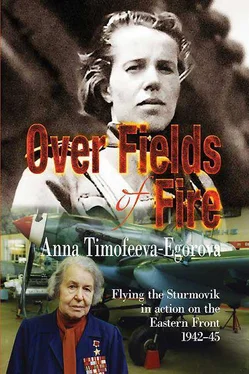“Of course”, I recalled, “It’s Saturday today!” So many weeks in a row we’d worked with no days off — we could afford one. The girls’ idea was a good one — off to the forest. The weather was as if ‘on demand’. And the area around Tver’ 61 61 Translator’s note — the pre-revolutionary name of the city of Kalinin — now Tver’ again.
is crawling with inviting places. And there’s no need to walk far — get on a tram and it’ll take you right to the pine-forest, the one beyond the ‘Proletarka’ Textile Factory.
When the first tram left we left with it. The instructors were glad — after all this time we’d got together. The car was filled with laughter, jokes and songs… The conductor was outraged, “You’re playing up like schoolkids — there’s no keeping you in check!”
There were five of us girls there: two aircraft mechanics, two Marias (Nikonova and Piskounova), two volunteer pilot instructors (Tamara Konstantinova and Masha Smirnova) and the two of us, pilot instructors via the Kherson aviation school: Katya Piskounova and I. Later, during the war, at night the latter would drop ammunition and provisions from her defenceless Po-2 down to the marines of a landing party at Eltigen. 62 62 Translator’s note — the scene of fierce beach fighting on the Black Sea coast in the Caucasus during WWII.
…But for now we were walking, feasting our eyes on marvellous spaces… The fading lilies of the valley showed through the grass in places — like a gift of nature… We came out on the Volga river, chose a comfortable spot on her high right bank and sat down, admiring the passing steamships. But usually music was heard from them and it was uncommonly quiet. And suddenly we heard the distinct voice of a radio announcer echoing in the forest: “We are at war…”
All nature’s colours faded then and there. Our cheerful mood had vanished somewhere. In a moment we became older than our years. All of us standing in that Sunday morning forest were certain: the country was rising to a mortal battle. And each of us who had mastered a military profession decided for herself not to stay out of it. Someone said briefly: “Time to go home”, but in less than an hour we all encountered each other at the city military commissariat. Our little ruse against each other hadn’t worked but our visit to the commissar’s office turned out to be futile.
“Do your job, girls”, the military commissar responded to our request to send us to the front. “You’ll have enough work in the rear now.”
I had enough patience to stay at the aeroclub’s peaceful aerodrome only for a month and a half. The alarming reports of the first days of war were stirring us up and at the same time we were informed that it had been ordered to evacuate the aeroclub into the deep rear. The day came when I walked to a train heading off to Moscow. Mousya Nikonova, my plane’s technician, saw me off. Her husband, a tankman, had been badly wounded and was dying in one of the city hospitals. Mousya didn’t cry but her beautiful face with brown almond-shaped eyes had become thin and dull. Another tanker who’d lost his arm lay in an adjacent ward. He was the husband of Tatyana Nikoulina, with whom we’d studied in the Metrostroy aeroclub. She’d come to him from Moscow, leaving her small daughter in the care of neighbours, and sat in the ward next to her maimed husband day and night, comforting and tending him as best she could. The war was already making itself felt — very brutally, sometimes irremediably…
At the train station Mousya Nikonova kissed me and putting a silver rouble into the left breast pocket of my blouse said quietly, “It’s a talisman. You’ll give it back to me when the Fascists are smashed.” This talisman… It would be with me through the whole war. By some miracle I saved it but managed to return it to Mousya only many years later. She considered me dead and only through one item in a newspaper got to know my approximate address and found me. I remember standing near the house gate and seeing a woman with a vaguely familiar face coming towards me from the bus stop. She came up and began asking if I knew where to find… and then she fell silent and began to cry, having recognised me…
But all this was a long way off and at the moment I was on my way to Moscow to the OSOAVIAHIM Central Council. I found my way with difficulty to Three Stations Square 63 63 Translator’s note — a square in Moscow with the three major train stations facing onto it.
, I noticed the camouflage on the buildings: they were covered with something like theatrical scenery. I was also astounded by the white paper crosses on the windows. The absence of the customary train station hustle and bustle was depressing. Men in military uniform walked about the station halls and words of command rang out loudly. When I was running across the square I nearly ran face first into a silvery gondola — soldiers were cautiously leading a balloon… I was also astonished by the flak guns in Krasnosel’skaya Street, these stood on the roofs of the many-storied buildings like cranes on long legs. And this was the atmosphere all along my way to Toushino: flak guns in parks, columns of troops, recruitment posters on the walls, a stern reserve in the behaviour of people in the streets. Not only the outskirts but the central thoroughfares of the capital were cluttered with lines of anti-tank hedgehogs 64 64 Translator’s note — large caltrop-like obstacles made of welded railway girders.
and barred with barricades. Moscow — now a frontline city — was becoming more and more austere day by day. Every day Levitan’s 65 65 Translator’s note — Yuri Levitan — a well-known radio announcer during WWII.
voice gave the Moscovites more and more alarming reports on the radio: “After stubborn and fierce fighting in the course of which…” The Sovinformbureau 66 66 Translator’s note — abbreviation of ‘Soviet Information Bureau’.
communiqués reached people everywhere: at home, at work, in the street. It was impossible not to get sick of them…
I am slowly riding a frequently-stopping bus and, pressing my face to the window-glass, look at a girl in military uniform standing at an intersection with an energetically raised red signal flag. She’s a traffic controller letting a troop column through. It was an ordinary tense day of war… I get to the building I need, a Colonel has a brief glance at the document I hold out to him and says in a hoarse and tired voice: “Egorova? And what do you, Egorova, want from me? What has happened back at your Kalinin? No petrol? Not enough planes? Please report quickly. You can see how many people are waiting.”
Indeed the room, stained black with tobacco smoke, was crammed with airmen: old and young, in civilian clothes and in field uniform. All of them were talking, exchanging the latest news, awaiting here — in one of the offices of the Central Aeroclub — resolution of their issues and their fate. I had no intention of wasting their time.
“Actually, I have only one question. A personal one”, I said loudly trying to talk over the noise.
The Colonel threw out his arms, “Is this the time to deal with personal issues?”
“Sorry, I’ve didn’t express myself properly”, I was embarrassed. “I’m only asking you to send me to the front.”
“Oh, come on, ‘only’”! The owner of the office unbuttoned the collar of his blouse. “You all repeat over and over again — to the front, to the front. If I do it your way OSOAVIAHIM’s work will have to be wound down completely. And who, I ask you…”, by the way the Colonel angrily looked around the whole office one could guess he was responding not only to me. “Who, I ask you, will train personnel for the front? No, sweetheart, go back to Kalinin and do what you’re supposed to do! Who’s next?”
Читать дальше












